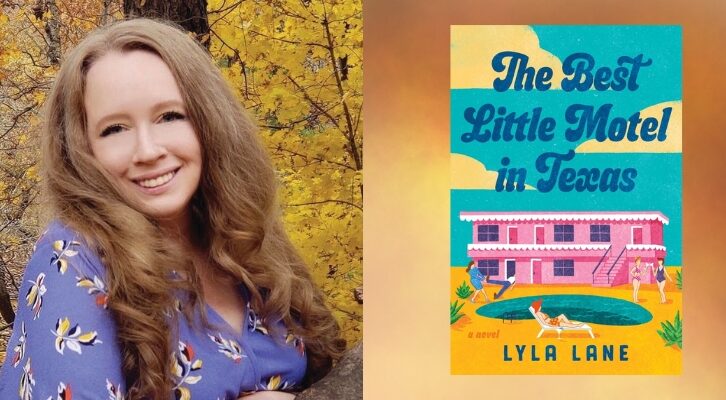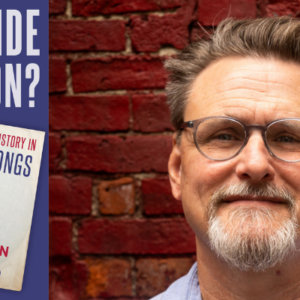
Why Where We Write Matters
Tanaz Bhathena on Her Understanding of Home, from Bombay to Bilimora
I write from my living room in Mississauga. At a folding table, found at a haraj in Jeddah over fifteen years ago, facing a window overlooking the driveway leading up to our condominium building. In the summer, the grounds turn a verdant green and landscapers plant red and yellow tulips and other flowers I don’t recognize in a large kidney shaped patch next to a Canadian flag. My laptop is surrounded by binders of my latest research articles, post-it notes and legal pads with scribbled scenes, and printouts of old novel drafts that gather dust.
I have written in coffee shops, airplanes, and library carrels, in twenty four countries, on three different continents. But, somehow, no writing is nearly as effective as the kind I do in Mississauga. No matter how many places I’ve travelled to, I’ve somehow always ended up here, in this living room, my restlessness soothed to writerly calm as I write story after story about the Middle East. More specifically about Saudi Arabia, the country my parents and I left behind for hopes of a better future.
* * * *
I was born in Mumbai in the 1980s, a time when many Indians were moving abroad, specifically to the Arabian Gulf, for employment. My father did the same, landing a job in the offices of a limestone factory in Riyadh, and my mother and I joined him a few months later, when I was about a year old.
In Riyadh, I lived close to a street named after the Arab poet Mutanabbi. On weekday evenings, we would visit the shops there, lit bright with lights, surrounded by the smell of roasted nuts and fül. I grew up on a street named after another poet, Jarir, whose name has now been immortalized by the chain bookstores seen in every major city in Saudi Arabia—one of which was located right across the street from my apartment building. By the time I was seven, that bookstore became my haunt, specifically the second floor which was stacked with novels. I went there on every birthday, spending every riyal of my allowance to buy books—windows into the world outside Saudi Arabia, where I solved mysteries with five children on a treasure island or played with brightly painted princesses in Disney picture books.
My parents encouraged this obsession of mine with the outside world. Home, they told me, wasn’t Saudi Arabia, but India, the country I was born in, the country that had issued my passport. In Saudi Arabia, we were expatriates, not immigrants—the expectation was to always return to our homelands. This was reinforced at my school, which was run by the Embassy of India in Riyadh, where Arabic was a choice—a third language elective that could be taken along with the compulsory second language, Hindi.
As a child I did not question all this. When we went to India during the summer holidays, I spoke with my cousins in Gujarati, the language my forefathers adopted hundreds of years ago upon migrating to India from Iran. In India, I was by all means, a normal Indian girl, apart from the few instances when the differences between me and my cousins were highlighted: I could fall sick from eating street food or from gargling tap water, while my cousins just seemed naturally immune. “You have NRI problems,” someone told me with a laugh. NRI being Non-Resident Indian which, I eventually learned, was no better than an expatriate in Saudi Arabia.
I was home, everyone kept assuring me. Yet it never felt like I was. Home, to me, always resonated with the deep breath I took upon landing once more on the tarmac of King Khalid International Airport in Riyadh, the sigh of relief I let out into the stale air of our closed up apartment on Jarir Street, surrounded by my own books and toys.
* * * *
As a ten year old, I did not care much for the sea. In Jeddah, the smell of it, rotting and fishlike, clung to our clothes, melded with the sweat that made my abaya stick to my skin. The sea followed me wherever I went and I began to long for Riyadh again, for Batha, instead of Balad, for Akaria Mall, instead of Jamjoom Center, for air that was arid instead of thick with humidity.
I looked for ways to escape and found my solace in writing. My very first attempts were adventure stories blatantly inspired by Nancy Drew and Fear Street, about girls solving murder mysteries or turning into werewolves at a boarding school. I never considered writing anything based on my own life, which seemed utterly boring and unadventurous in comparison—an endless stretch of home to school, school to home journeys, with supermarket visits, Ramadan breaks and summer vacations interspersed in between.
When I was fourteen, our school reassigned classrooms, plucking out me and a friend from the section of girls we’d grown up with through middle school, and placing us in another one. As it so happens, when classroom sections change, friendships do so as well. We drift apart. We lose people to misunderstandings. I wrote a short story loosely inspired by these incidents and submitted it to a popular Dubai-based youth magazine.
I was surprised when a girl in my new section approached me to compliment the story. “My mom read it, too, and it made her cry,” she told me. Until then, I had no idea that my words had any kind of power at all, let alone the kind to move people to tears. It was the first time I realized that that my life, as ordinary as it seemed, could resonate with someone else.
* * * *
My parents immigrated to Canada in 2001, a country I knew very little about apart from the fact that it had a pretty flag and was called The Land of the Maple Leaf in my General Knowledge textbook.
In Canada, I found all the books I could never afford to buy in Saudi Arabia. There were libraries here and the Central Library in Mississauga became an instant favorite of mine, with its giant collection of books, audiobooks, tapes and DVDs.
I was Matilda without the hand cart, often checking out more books than I could read in the three weeks allotted to me. I was Belle in the Beast’s giant library. I was voracious. I devoured. Out of curiosity, I also checked out books about Saudi Arabia – including the banned ones that senior girls from my old school would share with their friends, having somehow managed to smuggle them past airport customs in Jeddah.
I began reading for nostalgia, starting with the Princess series by Jean P. Sassoon, followed by Girls of Riyadh by Rajaa Al Sanea, Finding Nouf by Zoe Ferraris and Eight Months on Ghazzah Street by Hilary Mantel. This list was by no means exhaustive, but it was the only one I could find at that moment, the closest I could come to revisiting the home I left behind.
For my parents, things were different. For them, “home” always referred to India, the country they were born and grew up in, and back home could mean anywhere from Bombay to Bilimora, places I visited during summer vacations, but never lived in long enough to feel like I belonged.
Home, for me, by then was a place where I could hear the call of the muezzin crackling over mosque speakers every night before going to bed, where the smell of the sea clung to my clothes, where I could find a shawarma shop on every street corner. I found solace for my alienation in novels about immigrants: Jhumpa Lahiri’s Unaccustomed Earth, Rohinton Mistry’s Tales from Firozsha Baag, Amy Tan’s The Joy Luck Club.
Though I continued reading like a glutton, by the time I completed first year at university, the stories I wrote diminished in number. So much that for the next three years I barely wrote at all. There was no time to write—or so I told myself—not with tests and midterms and finals, not with the CA firms that would come recruiting in three years so that I could follow in my father’s footsteps, my feet struggling to walk in shoes that always seemed impossible to fill.
* * * *
There are things about Mississauga that remind me of Jeddah. Both cities are located by big water bodies (it’s easy enough to pretend at times that Lake Ontario is the Red Sea), both have mega-malls, both are cosmopolitan. Even the neighborhood I live in strangely resembles my old home in Jeddah—a quiet suburban building surrounded by trees that diffuse traffic sounds from the main road. There are times when the unexpected similarities jar my senses—so much that when I see a group of women wearing abayas inside a Canadian parking lot I have the illusion of being in two places at once.
* * * *
It was not until my fourth year at university, that I finally admitted to myself and my parents that I wanted to be a writer and not an accountant. After a couple of failed attempts at writing a fantasy novel, I ended up writing a short story about an Indian girl living (and dying) in Saudi Arabia. It bubbled out of me spring-like, as if a rock was suddenly removed from a place where I had not known water existed.
* * * *
Five years ago, on a trip to New York, a friend told me I should move to the city for inspiration.
“You’re a writer. Don’t a lot of writers live in New York anyway?” she said.
By then, I’d had some success with writing: several literary grants from the Ontario Arts Council and the Canada Council for the Arts, a few short story publications under my belt. I was by no means prolific, but I had managed to sign a contract with a literary agent, who loved my work.
On the surface, my friend’s suggestion seemed to make sense. I already had friends who lived in the city. New York was cosmopolitan, culturally vibrant—a proverbial writerly Ganga in which JD Salinger, Jennifer Egan and Colum McCann had immersed themselves and broken the surface with some of their best books.
But when it came myself, I froze. Every part of me rejected the idea of moving to a different country, even though I couldn’t articulate why.
* * * *
A few months after that trip to New York, I went to Spain solo, partly inspired by the hot players on the Spanish national soccer team, partly by photos of Antoni Gaudi’s modernist art in Barcelona and the Moorish magnificence of the Alhambra in Granada. Barcelona was my Paris, the Sagrada Familia my Louvre, Las Ramblas my Champs Elysees. Though I’d never thought of it until then, it seemed fitting that my European café dream involved churros con chocolate instead of croissants and café au lait.
Spain called to me in many ways that New York didn’t, but never enough to take a plunge and make a big move. I’ve visited several countries after moving to Canada—for work or pleasure—but have never again experienced the odd sense of contentment that I did as a 16 year old in 2001, in the quiet bedroom of a rented apartment in Mississauga, right across the condominium that would eventually become my home.
* * * *
It’s four in the morning in Mississauga. While my family still sleeps, I tip toe to my spot in the living room and switch on a small lamp. I glance out of the window, into the dark, thinking I’ll write something different today. Set in the Alhambra. Maybe Times Square. After several minutes of struggle, I allow my mind to wander back home: to the pistachio and fül scented shops of Mutanabbi Street, to the briny Red Sea air of the Jeddah Corniche. Words pour out in a stream of clicking keyboard sounds.
Inspiration, I have learned, comes not only from the places we grow in, but also the places we grow into long after leaving them behind.
Tanaz Bhathena
Tanaz Bhathena was born in Mumbai and raised in Riyadh, Jeddah and Toronto. Her short stories have appeared in various journals, including Blackbird, Witness and Room Magazine. Her debut YA novel, QALA ACADEMY, will be published by Farrar Straus Giroux Books for Young Readers/Macmillan in the fall of 2017.



















